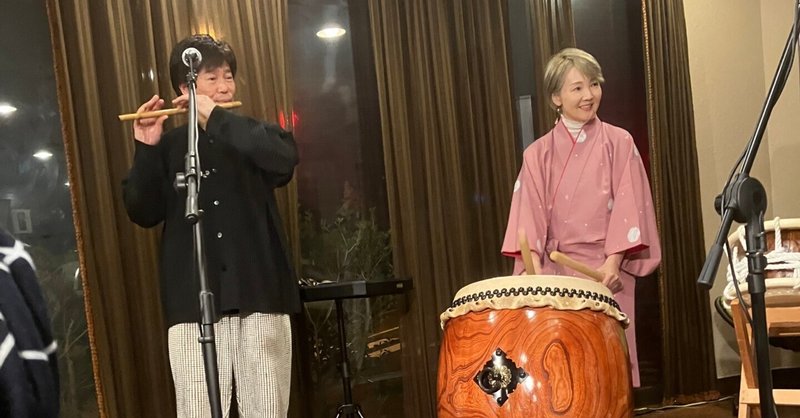
A NIGHT IN SHICHIRIYA KANO YASUKAZU'S LIVE SHOW m.29.'24.
Yasukazu Kano
and Kazumi Aren performed absolutely stunning Chord
music on the Shinobue at Shichiriya Sabo in Iida, Nagano, Japan
During the performance, I even experimented with a glass of water to produce an even deeper and richer sound than I had ever imagined possible for the Shinobue! When writing a review that is neither jazz nor classical, it can be easy to get confused! Today, I struggled to put into words an emotion that was not a discrepancy, but rather something that had become ingrained in me. During the break, Kano confirmed that he was also a skilled shakuhachi player under Yokoyama's tutelage. He was also a professional jazz drummer who was deeply influenced by Erwin! However, I did not perceive Kano's current expression as a direct reflection of his past learning and experience! I refrained from taking notes, including song titles, and fully immersed myself in the world of Kano's expression.
The shinobue is the only musical instrument that originated in Japan! Kano gave a detailed explanation of its history, which began with a single hole, and played it with tremendous concentration! During his lecture and performance, Kano's deep and acute view of history was evident! Especially when he reached the onikenbai (devil's sword dance). He emphasized the importance of a lifetime of study with a niwamoto (master) to fully master the long, 28-song tradition and preserve its form and genealogy, which is linked to the protection of the community! He emphasized the importance of a lifetime of study with a niwamoto (master) to fully master the long, 28-song tradition and preserve its form and genealogy, which is linked to the protection of the community! He described it as uniquely Japanese! According to him, the traditional music of Hirosaki, Aomori, known as "mountain-climbing" and "mountain-descending" music, is played while climbing up and down a 1,700-meter mountain! Kano described the music as "tamari" and explained that the rhythm of the Japanese language is the basis of the music.
The second part consisted of a series of songs, starting with Kano's original, Fish Dance! Kano, who had a physical limitation that limited him to playing only small notes, used this challenge to create and perform a piece using only pianissimo! He accompanied his performance with a piano recording by Masaki Hayashi, known for his lyrical style. Kano's performance of "Natsu no Ko" marked a pivotal moment in his career, despite his initial inability to play the original version of the song. After performing "My Favorite Things", Kano, a former jazz musician, sang his original song "I NO CHI"! This was actually an anti-war song, as well as 'Hanamizuki', another original song from his album MATSURI, and 'Inside Out', a Latin number also from MATSURI.
Despite his shy demeanor, his music spoke volumes. Kano's captivating performance left the audience spellbound! As a writer, I refrained from interviewing him.
この記事が気に入ったらサポートをしてみませんか?
